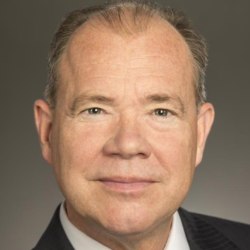Raising Gas Taxes While Unions Support Billions for Bullet Train
Editor’s Note: It is difficult to find a better example of how California’s labor movement fails ordinary workers than their support for high speed rail. Because that project, using foreign sourced materials and yielding virtually no benefits – economic, environmental, or societal – that justify the cost, is at the expense of projects that are sorely needed. Money is fungible and finite. As Jon Coupal writes, California’s union controlled legislature is now considering raising gasoline taxes. But instead of raising gasoline taxes, the money we’re spending on high speed rail could instead be used to repair and upgrade California’s roads, all of them, everywhere, with tens of billions left over for other compelling projects, such as sewage treatment and reuse facilities, or desalination plants. These projects would create far more jobs and yield far greater benefits to ordinary Californians. Isn’t that what unions want? Union support for high-speed rail is an epic betrayal of the ideals they are uniquely positioned to advocate. It is shameful.
Sacramento is about to launch a new attack in its ongoing war on drivers.
California’s 48.6 cent gas tax already ranks second out of 50 states –- the feds take another 18.4 cents — and when the hidden carbon tax, part of the cap-and-trade program, is factored in, our state leads the pack by a wide margin. But this is not nearly enough, according to the political class.
Sen. Jim Beall is building a coalition of both Democrats and Republicans in the Legislature to hike gas taxes along with vehicle license fees and registration.
The San Jose lawmaker’s Senate Bill 16 slams taxpayers in three ways. First, it would raise at least $3 billion annually by increasing the gas tax by another 10 cents a gallon. Second, it would hike the vehicle license fee, which is based on value, by more than 50 percent over 5 years. Third, it would increase the cost to register a vehicle by over 80 percent.
Although the backers of the SB 16 tax increase say it is vital to make up the claimed $59 billion backlog in roadway maintenance, some of the funds are slated to go to repaying transportation bonds that, when passed, were to be paid from the general fund. This means that not all of the new revenue will go to the stated intent of fixing roads and highways.
Whatever the actual dollar amount of the backlog in roadway maintenance, this shortfall is the result of previous diversions of gas tax and truck weight revenue to budget items that have no direct impact on road improvement, and Beall’s bill would allow this practice to continue.
It should not go unnoticed that the $59 billion estimated backlog approaches the $68 billion that the governor and Legislature want to spend on the bullet train. Quentin Kopp, former chairman of the California High-Speed Rail Authority, has become a strong critic, characterizing it as “low-speed rail” due to the changes that have been made to the original plan that voters were promised to convince them to provide seed money for the project in 2008. He adds that to be financially viable, high-speed trains need to run from 10 to 20 trains per hour, but due to the current plan, called a “blended system,” slower trains and bullet trains must share the same track, reducing the number of fast trains to about four per hour. And even supporters of the project as currently envisioned concede that the Los Angeles to San Francisco trip that voters were told would take about two-hours and forty minutes for a $50 fare, will likely take closer to 5 hours at nearly double the cost to the rider.
So, while Sacramento politicians and special interest insiders, including unions and construction companies, continue to push for billions of dollars of new spending on a high-speed rail system that is not expected to be completed before 2029, they expect drivers, fed up with bumping along on crumbling roads and highways, to pay more.
Gas prices in California are already tops in the nation. If taxes are increased again, every motorist should be given a railroad engineer’s cap compliments of Sacramento lawmakers and the governor because the extra they pay will free up money, which could have been used for roads, to be spent on their pet train.
Jon Coupal is president of the Howard Jarvis Taxpayers Association — California’s largest grass-roots taxpayer organization dedicated to the protection of Proposition 13 and the advancement of taxpayers’ rights.
